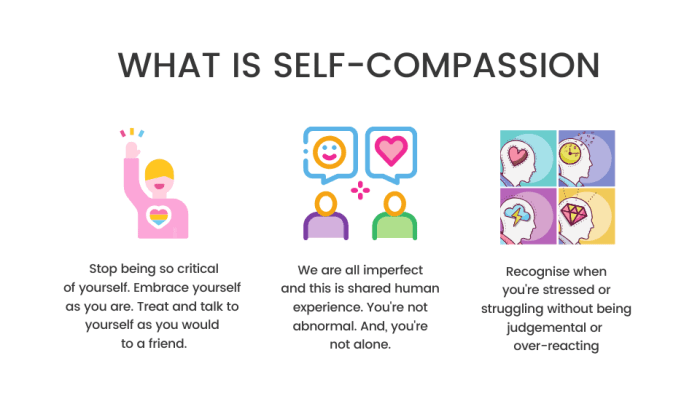How to Meditate for Deepening Your Self-Compassion sets the stage for a transformative journey into the realm of self-love and acceptance, offering a path to inner peace and emotional healing.
In this guide, we will explore the profound benefits of self-compassion meditation, techniques to deepen your practice, and strategies to overcome obstacles along the way.
Introduction to Self-Compassion Meditation

Self-compassion meditation involves directing feelings of kindness, care, and understanding towards oneself. It focuses on treating oneself with the same warmth and empathy that one would offer to a close friend in times of difficulty.
Benefits of Practicing Self-Compassion Meditation
- Improves mental well-being by reducing symptoms of anxiety and depression.
- Enhances emotional resilience and the ability to cope with stress.
- Fosters a positive self-image and increases self-acceptance.
- Promotes healthier relationships with oneself and others.
Examples of How Self-Compassion Meditation Can Improve Overall Well-Being
- By acknowledging and accepting one’s flaws and mistakes, individuals can cultivate self-forgiveness and move towards self-improvement.
- Self-compassion meditation helps individuals develop a greater sense of inner peace and contentment, leading to improved overall happiness.
- Practicing self-compassion can lower levels of self-criticism and self-judgment, creating a more compassionate and understanding internal dialogue.
- By prioritizing self-care and self-compassion, individuals can experience reduced feelings of burnout and increased motivation in daily life.
Developing a Meditation Routine

Creating a routine for your self-compassion meditation practice is essential for reaping its full benefits. Consistency is key in deepening your self-compassion and overall well-being. Here are some tips and strategies to help you establish and maintain a meditation routine:
Create a Conducive Environment
Setting up a peaceful and comfortable environment can enhance your meditation experience. Find a quiet space where you won’t be disturbed, dim the lights, and consider using props like cushions or a blanket to support your posture. You may also want to incorporate elements like candles, essential oils, or calming music to help you relax and focus.
Embark on a spiritual awakening through meditation with these 7 key practices: How to Meditate for Spiritual Awakening: 7 Key Practices. Explore mindfulness, gratitude, and self-reflection to deepen your spiritual connection.
Importance of Consistency
Consistency is crucial in any meditation practice, especially when cultivating self-compassion. Aim to meditate at the same time each day to build a routine that becomes a natural part of your day. Whether it’s morning, afternoon, or evening, find a time that works best for you and stick to it.
For beginners looking to start meditating at home, here are 6 easy steps to get you started: How to Meditate at Home: 6 Steps for Beginners. Find a quiet space, set aside time each day, and begin your journey towards inner peace.
Overcoming Obstacles
It’s normal to face obstacles when trying to maintain a meditation routine. Common challenges include lack of time, distractions, restlessness, or self-doubt. To overcome these obstacles, start with shorter meditation sessions and gradually increase the duration as you become more comfortable. Remind yourself of the benefits of self-compassion meditation and stay committed to your practice, even on challenging days.
Techniques for Deepening Self-Compassion

Deepening self-compassion through meditation involves specific techniques that can help cultivate a greater sense of kindness and understanding towards oneself. By integrating mindfulness into self-compassion practices, individuals can enhance their ability to be present with their emotions and respond to themselves with care and compassion.
To release negative energy through meditation, follow these 10 steps outlined in this helpful guide: How to Meditate to Release Negative Energy: 10 Steps. By practicing these techniques, you can create a more positive and peaceful mindset.
Visualization Meditation
Visualization meditation is a powerful technique that can deepen self-compassion by creating vivid mental images that evoke feelings of love and acceptance towards oneself. During meditation, imagine yourself in a peaceful and nurturing environment, surrounded by light and warmth. Visualize yourself extending love and compassion towards your own heart, embracing yourself with kindness and understanding.
Loving-Kindness Meditation
Loving-kindness meditation, also known as metta meditation, involves cultivating feelings of love and compassion towards oneself and others. Start by repeating phrases such as “May I be happy, may I be healthy, may I be safe, may I live with ease.” This practice helps to generate feelings of goodwill and warmth towards oneself, fostering self-compassion and emotional resilience.
Body Scan Meditation
Body scan meditation is a mindfulness practice that involves systematically scanning the body for sensations without judgment. By bringing awareness to physical sensations and emotions, individuals can develop a greater sense of self-awareness and self-compassion. During meditation, focus on each part of your body, acknowledging any tension or discomfort with a gentle and compassionate attitude.
Overcoming Challenges in Self-Compassion Practice: How To Meditate For Deepening Your Self-Compassion

When practicing self-compassion meditation, it is common to face challenges that can hinder your progress. However, with the right strategies, you can overcome these obstacles and deepen your self-compassion effectively.
Dealing with Self-Criticism during Meditation
Self-criticism can be a significant barrier to cultivating self-compassion during meditation. When you notice self-critical thoughts arising, try the following strategies:
- Acknowledge the self-critical thoughts without judgment. Recognize that it is normal to have these thoughts and that they do not define your worth.
- Shift your focus to self-compassion by repeating affirmations or mantras such as “I am deserving of love and compassion” to counteract self-criticism.
- Practice self-compassion exercises like loving-kindness meditation to cultivate feelings of kindness and understanding towards yourself.
Navigating Difficult Emotions during Self-Compassion Practice
Difficult emotions may surface during self-compassion practice, making it challenging to stay present and compassionate. Here are some ways to navigate these emotions:
- Allow yourself to feel the emotions without judgment or resistance. Acceptance is key to processing and releasing difficult emotions.
- Practice mindfulness by observing the emotions as they arise, acknowledging their presence, and letting them go with each breath.
- Engage in grounding techniques such as deep breathing or body scans to help you stay connected to the present moment and manage intense emotions effectively.
Cultivating Loving-Kindness Towards Oneself

When it comes to self-compassion, cultivating loving-kindness towards oneself plays a crucial role in enhancing one’s overall well-being and inner peace. Loving-kindness meditation, also known as Metta meditation, focuses on developing feelings of love, compassion, and goodwill towards oneself and others.
Relationship between Self-Compassion and Loving-Kindness Meditation
Loving-kindness meditation is often integrated into self-compassion practices as it helps individuals foster a deeper sense of kindness and compassion towards themselves. By cultivating loving-kindness, individuals can soften self-criticism, build self-acceptance, and nurture a more positive relationship with themselves.
Examples of Loving-Kindness Phrases for Self-Compassion, How to Meditate for Deepening Your Self-Compassion
-
May I be happy. May I be healthy. May I be safe. May I live with ease.
-
May I be kind to myself in moments of struggle. May I forgive myself for past mistakes. May I be gentle with my inner critic.
-
May I accept myself as I am. May I be at peace with all that I am.
Impact of Cultivating Loving-Kindness Towards Oneself
Cultivating loving-kindness towards oneself can have a profound impact on overall self-compassion levels. It can lead to increased self-awareness, emotional resilience, and a greater sense of interconnectedness with others. By practicing loving-kindness towards oneself, individuals can transform their inner dialogue, enhance self-acceptance, and cultivate a more compassionate and loving relationship with themselves.
Embark on a journey of self-discovery and compassion as you delve into the practice of meditation. By cultivating a kinder inner dialogue and nurturing self-compassion, you can unlock a newfound sense of well-being and emotional resilience.